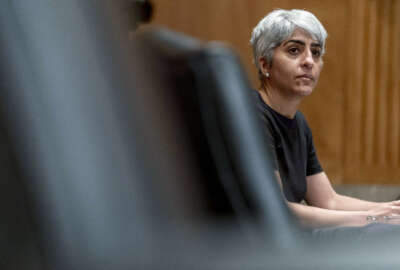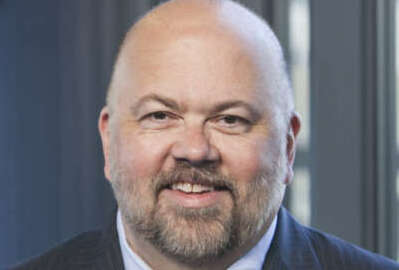
After 20 years, CHCO Council eyes more reforms to federal human capital
Chief human capital officers and other federal workforce leaders celebrated 20 years of the CHCO Council by reflecting on past successes and sharing plans to...

Panel of awards winners discusses past and future goals for the CHCO Council at 20th anniversary celebration and awards ceremony. From left to right: CHCO Council Executive Director Margot Conrad (at podium), VA CHCO Tracey Therit (CHCO of the year Award winner), Former Deputy Commissioner of the Social Security Administration’s Office of Human Resources Reginald Wells (Founder Award winner), Merit Systems Protection Board Vice Chairman Raymond Limon (Lifetime Service Award winner), Former Department of Agriculture CHCO William Milton, Jr. (OPM Collaborator Award winner), OPM Director Kiran Ahuja. Photo courtesy of the Office of Personnel Management.
Following two decades of gradual hiring reforms, chief human capital officers have more plans underway to try to improve recruitment and retention for the federal workforce.
Recent efforts from the Chief Human Capital Officers (CHCO) Council, composed of federal human capital leaders, have included establishing an executive steering committee, and increasing agencies’ ability to hire multiple candidates off a single job announcement. Celebrating 20 years of work from the council, agency leaders reviewed successes and areas for growth at an anniversary ceremony on May 18.
“We are developing the forthcoming HR career growth platform that will support the growth and development of the HR workforce,” said Margot Conrad, executive director of the CHCO Council, at the event. “The council has also played a critical role in helping shape human capital policy. During my time with the council, we’ve tackled a number of issues … the 10-year term appointment, the non-competitive reinstatement of former federal employees at a higher grade level and increased use of pooled hiring and sharing of certificates — just to name a few.”
The Office of Personnel Management has also started scheduling CHCO Council personnel policy office hours, to get more direct input on policy considerations. So far, that has included topics like internship guidance pathways and updates to telework and remote work guidance, Conrad added.
In an effort to strengthen the role of the CHCO Council as a whole, OPM recently made proposals to Congress. One significant proposal was to permanently house the CHCO Council within OPM.
“This ensures that OPM and CHCOs are closely aligned to create an even stronger federal workforce,” OPM Director Kiran Ahuja said at the event.
Another proposal related to CHCOs was to create a senior leadership position at OPM, dedicated to workforce planning for federal HR practitioners, Ahuja added.
Along with some of these newer ideas, CHCO Council members are also looking to scale up practices that have seen early success. For the Department of Health and Human Services, for example, pooled hiring announcements have been key to hiring for mission-critical occupations and other typically difficult-to-hire positions.
“Whether it’s an HR professional, an acquisition or IT specialist, there are plenty of shared positions where we all will benefit from working together collaboratively in these processes, rather than having separate processes consuming additional time unnecessarily,” HHS CHCO Bob Leavitt told reporters at the event. “Shared hiring is a significant opportunity for us to reduce the time that it takes to hire, particularly for either these mission-critical occupations or highly specialized areas where we really need to help support one another.”
Within the CHCO Council, an executive steering committee created in 2021 is trying to broaden its role to support human capital reform as well.
“We want to make sure that [OPM] had a group of seasoned HR professionals that they could pressure test different ideas, pressure test different things that we’re thinking about to make sure it makes good sense,” National Science Foundation’s CHCO Wonzie Gardner, a member of the steering committee, told reporters. “I think the biggest point that we make as an advisory council [is that] we give, not necessarily consent, but we give direction, and we give an impact how it’s going to play out to organizations.”
At the ceremony, some reflected on the early days of the CHCO Council, and how much it has changed in the last 20 years.
“Some of us came to the council not knowing what to expect — some of our missions are quite different from others,” said Reginald Wells, former deputy commissioner of the Social Security Administration’s Office of Human Resources, and an original member of the CHCO Council. “It was just an exciting time, we all were curious about what this was going to mean collectively.”
Beyond the CHCO Council’s outline of its recent initiatives, upcoming priorities and top barriers for the federal workforce in its 2022 report to Congress, human capital leaders reflected on what they hope to see in the federal workforce itself in years to come.
“Looking for a government that’s more inclusive, where mothers, fathers, children see themselves in what we do, because it adds value to their lives,” Department of Veterans Affairs CHCO Tracey Therit said. “[We want to see] children want to grow up to be the new next director of OPM … they want to be the next CHCO at the Department of Homeland Security, they really see and understand what the government does and how they can be part of it.”
OPM also announced winners of four awards during the CHCO Council ceremony:
- Founder Award — Reginald Wells
- Lifetime Service Award — Raymond Limon
- OPM Collaborator Award — William Milton, Jr.
- CHCO of the Year Award — Tracey Therit
Copyright © 2025 Federal News Network. All rights reserved. This website is not intended for users located within the European Economic Area.
Drew Friedman is a workforce, pay and benefits reporter for Federal News Network.
Follow @dfriedmanWFED






